JERUSALEM, June 1: Israel will build 884 more houses in east Jerusalem, the housing ministry said on Sunday, in a move that enraged the Palestinians who have demanded it as the capital of their promised state.
“We will invite tenders for the construction of 121 housing units in Har Homa and 763 others in Pisgat Zeev,” ministry spokesman Eran Sidis said, referring to two neighbourhoods in Arab east Jerusalem.
Israel occupied and annexed the eastern half of the city after the 1967 war in a move not recognised by the international community or the Palestinians, who have demanded it as their capital in recently revived peace talks.
“These offers are being published for the occasion of Jerusalem Day (on Monday), celebrating the 41st anniversary of the reunification of the city,” Sidis said, referring to the occupation of east Jerusalem in the Six Day War.
Jerusalem Mayor Uri Lupolianski defended the move, telling public radio it was necessary to address the “urgent need for housing for the Jewish population.” But Palestinians slammed the decision, saying it undermined peace efforts.
“We strongly condemn this decision, which is a continuation of similar decisions to expand settlements that have never stopped,” Palestinian senior negotiator Saeb Erakat said.
A statement from the office of Palestinian president Mahmud Abbas called the decision a “dangerous threat” to the peace process, saying it “cannot advance without a complete and total halt to settlement activity.” The Israeli settlement watchdog Peace Now also criticised the move, which it said was part of a larger effort by the Israeli right to pre-empt the division of the city in a final peace deal.
“More settlements in Jerusalem will mean that the physical ability to have compromises between Israelis and Palestinians will be harder,” Peace Now director Yariv Oppenheimer told AFP.
A spokesman for the Egyptian foreign ministry called the decision “a veritable strike against the hope of finding a solution to the Palestinian issue,” and condemned the “silence” of the international community.
Egypt called on the US administration and the other main sponsors of the peace process — the European Union, Russia and the United Nations — to “stop these projects, the purpose of which is to cut Jerusalem off from the rest of the West Bank.” The latest planned expansions come on the eve of the next scheduled meeting between Olmert and Abbas, who have pledged to try to strike a full peace deal by January 2009.
The two have held several meetings since the talks were relaunched at an international conference hosted by US President George Bush in November but have made little apparent progress since then.
The Palestinians have repeatedly called the expansion of Jewish settlements in the West Bank including east Jerusalem the biggest obstacle to a final peace deal.
Israel considers the whole of Jerusalem its “eternal, undivided” capital and insists it will continue to build in both the city’s eastern sector and in the larger settlement blocs in the West Bank that it intends to keep in any deal.
“It’s clear that Har Homa and Pisgat Zeev will be part of Israel in any final status agreement,” government spokesman Mark Regev said. “This is not in any way in conflict with the peace process.” The Palestinian population of east Jerusalem currently stands at nearly 260,000 according to the Palestinian Authority, with the settler population at nearly 200,000, according to Peace Now.
The chances of reaching an agreement before Bush leaves office in January 2009 had already dimmed amid new corruption allegations against Olmert that threaten to unseat the prime minister.
On Monday, Olmert is to head to the United States for a three-day visit during which he is expected to discuss both the peace process with the Palestinians and recently renewed negotiations with Syria.
But at home he has faced mounting calls from the opposition and his own coalition partners to step aside, casting doubt on whether he will be able to make progress on either front.—AFP













































Dear visitor, the comments section is undergoing an overhaul and will return soon.